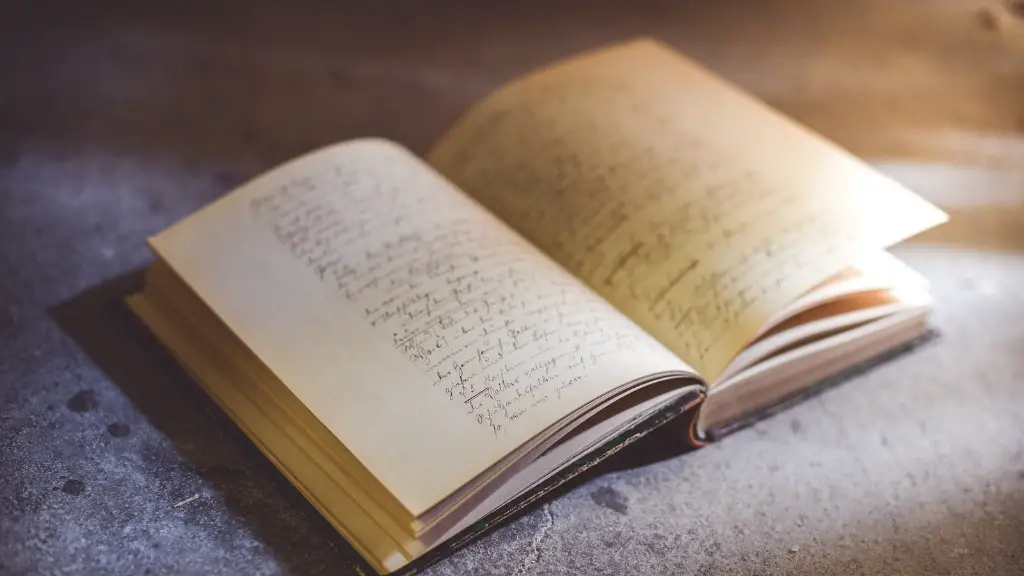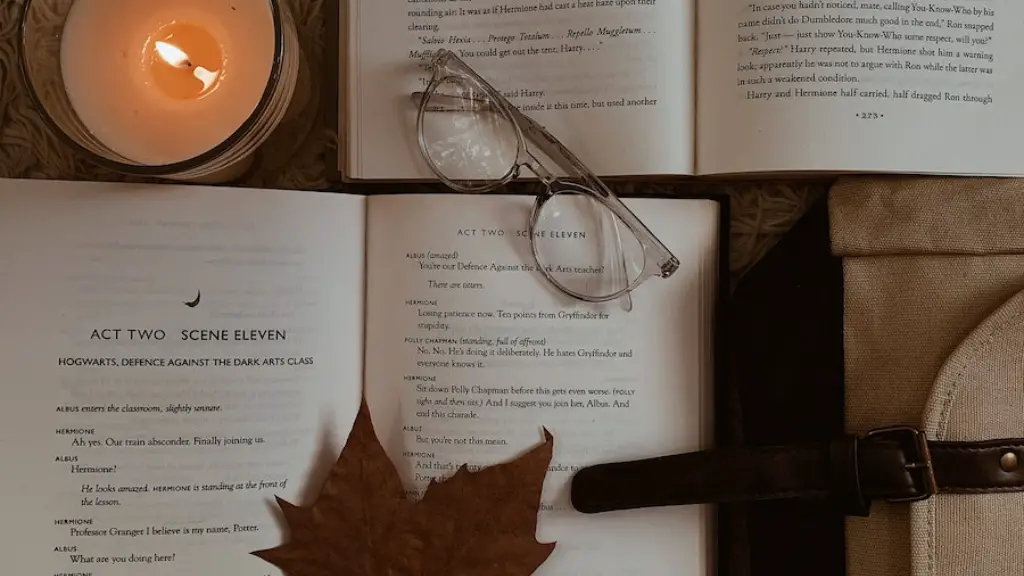Definition Of Poetry
Poetry is a form of art through which one expresses feelings, thoughts and emotions in creative and imaginative ways. It is a musical composition of words and phrases, used most commonly in a form of rhyming and verses. The primary elements of poetry are rhythm, imagery and symbolism, while the purpose is to create something that is aesthetically pleasing to the reader and articulates an author’s message. Often, poetry is linked to deeper meanings or even a personal journey.
Who Is The Father Of Poetry?
When it comes to the question of who is the father of poetry, the answer is still hotly debated. There are many different theories about the true “father of poetry”.
The Ancient Greeks were undoubtedly the first to systematically explore the literary form of poetry. They were the first to think of it as an important art form, and were the first to use it to create works of epic proportions. The Greeks are credited with creating many of the principles upon which the art of poetry is based; they introduced a varied menu of poetic styles and techniques: the Homeric epics, tragic poetry and even the beginnings of lyric poetry.
However, the Ancient Greeks had no singular figure that can definitively be considered to be the “father” of poetry. It is likely that the Ancient Greeks viewed poetry not as one singular art form, but more as a series of unrelated poetic movements.
In the Western world, a great majority of people would agree that Homer, the Ancient Greek poet, is the father of poetry. The Iliad and the Odyssey, two of Homer’s works, are widely regarded as two of the greatest works of Classical literature, and are often named by scholars as the best examples of Ancient Greek literature. It is thought that Homer wrote both stories in the form of hexameters, an ancient form of verse which places emphasis on a tight pattern of recurring cadences, something which has now become known as poetic metre.
In Ancient India, the epic poem, the Ramayana, is often cited as the oldest known work of Indian poetry, having been written around 400 BC. The author of the Ramayana is widely thought to be the sage Valmiki, though again, this is disputed by some scholars.
History Of Poetry
The history of poetry stretches back to the ancient world. Poetry first appeared in oral forms in many of the world’s oldest civilizations – from the cuneiform writings of ancient Sumer, to the Vedic hymns of India, to the Epic of Gilgamesh. Poetry flourished during the ancient Greek and Roman empires and later during the medieval period in the Persian, Indian and Chinese cultures.
By the 19th century, the distinction between ‘high’ and ‘low’ poetry had crystallized. High poetry was thought of as more serious and refined and produced with conscious artistic intention, while low poetry was seen as less formal and more casual and utilitarian.
The beginning of the 20th century saw a surge in poets exploring and extending the boundaries of traditional poetic forms – from T.S. Elliot and Ezra Pound to Walt Whitman and W.B. Yeats. This ‘modernist’ movement pushed the boundaries of what was permissible in poetry and ushered in a new era of experimentation and innovation.
Forms Of Poetry
Poetry can exist in many forms and utilize different styles, techniques, and devices. It can be approached in different ways, depending on the style and the subject of the poem. Common forms of poetry include free verse, haiku, sonnets and odes.
Free verse is a type of poetry that does not adhere to a traditional pattern or form. It is based entirely on the poet’s imagination and is usually written in a more conversational tone. Haiku is a type of poem that is often composed of three lines, each containing seventeen syllables. Sonnets are lyrical poems often written in iambic pentameter and consist of fourteen lines. Odes are poems written in praise of something, such as a person or place.
Conclusion
The father of poetry is likely to remain the subject of debate for many years to come. While Homer has been credited as the most influential poet of the Western world, there is no single individual that can definitively be credited with the title. Ultimately, it is up to the individual to decide who they view as the father of poetry. However, one thing is certain: the art of poetry has long been a part of human culture, and will continue to influence the creative expressions of the world for centuries to come.
Influence Of Poetry
The influence of poetry can be seen in many aspects of life. Poetry has been used to express and articulate views, beliefs, emotions and opinions since the dawn of time. The art of poetry has been known to inspire moral courage, open the mind to new possibilities and bring people together.
Poetry has been used in literature, literature, music and theatre for centuries. It is often seen as a vessel for expressing and conveying stories, inner thoughts and feelings, opinions and beliefs. It is often a tool for social change, inspiring the masses to overcome adversity, challenge injustice and fight for their beliefs.
Poetry has been used as an important source of healing and solace, to soothe the pain of heartbreak, loss or suffering. Its words can paint a vivid imagery and provide a comfort to those who have experienced pain or suffering. Poetry can often move readers, inspiring them to take action and fight for a cause or bring hope in times of darkness.
Function Of Poetry
The main function of poetry is to communicate ideas and feelings, and to move people. Poetry has the power to capture moments, express emotions and communicate beliefs. It has the ability to evoke strong emotion and to bring powerful messages to life.
Poetry is an essential tool for conveying deep thoughts and expressing the human experience. Its words can offer insight into the complexities of the human heart and can help to heal the mind and soul. Poetry is also a form of creative self-expression and can provide a platform to explore and express one’s feelings.
Poetry can also teach us about ourselves, helping us to understand our thoughts and feelings. Through poetry, people can learn to understand and appreciate their own feelings. It can help to free us from the constraints of society and to be more in tune with our inner being.
Literary Value Of Poetry
Poetry is seen as an important form of literature and is seen as a higher form of art. It is an essential tool for conveying deep thoughts and expressing the human experience. Its words can offer insight into the complexities of the human heart and can help to heal the mind and soul.
Poetry is often seen as a more elite form of literature, one which can be appreciated through its depth and complexity. It has the capacity to paint intricate stories, images and emotions within a few words; art which can be appreciated for its beauty, mystery and grace. Poets often employ a variety of literary devices, such as symbolism and metaphor, to bring their words to life and to make their messages more powerful.
Furthermore, great poetry often stands the test of time, leaving its mark on history. A great poem will be studied and analysed for years to come, leading to its enduring importance and significance.
Modern Day Poetry
Modern day poetry has seen a resurgence in recent years. More and more people are connecting with poetry and seeing it as an important tool for self-expression and storytelling. Contemporary poetry often fuses together traditional poetic forms with a less structured approach, allowing poets to blend different styles and techniques to create something fresh and unique.
Social media has meant that anyone can now share their poetry with the world, opening it up to a much wider audience. Furthermore, modern day poets are often inspired by the news, current events and politics, creating artwork that reflects their society and the times in which they live.
Modern day poetry is often used to comment on society and to make political statements. The power of words and poetry can often move people to take action, to challenge injustices and to fight for a cause.
Power Of Poetry
The power of poetry lies in its ability to capture moments, to evoke emotions and to tell stories. It has the potential to change people’s perspectives, challenge their beliefs and open their eyes to new possibilities.
It has the capacity to inspire the masses and to initiate social change. Words have a powerful impact on society and poetry can be a powerful tool for questioning and challenging the status quo. Poetry has the potential to speak to people’s hearts, to move them to action and to bring people together.
The power of poetry lies in its ability to capture moments, create stories, elicit emotions and move people. Its words can help to heal, to give hope and to inspire. It has the potential to bring about social change and to challenge injustice.


